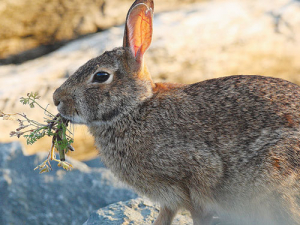Editorial: Having a rural voice
OPINION: The past few weeks have been tough on farms across the North Island: floods and storms have caused damage and disruption to families and businesses.
 NZ authorities are hoping to release a new strain of rabbit haemorrhagic disease, or calicivirus between March and June this year.
NZ authorities are hoping to release a new strain of rabbit haemorrhagic disease, or calicivirus between March and June this year.
New Zealand is about to open a new front in the war on rabbits with the expected release of a new strain of rabbit haemorrhagic disease, or calicivirus.
The new variant, known as RHDV1 K5, is approved in Australia and is due for release there March-June this year. NZ authorities also hope to release it about that time.
Environment Canterbury says it is acting for a national co-ordinating group to obtain the three statutory approvals needed. Graham Sullivan, Environment Canterbury regional leader biosecurity, says RHDV1 K5 could be an important biological control tool.
“While exact figures are unknown, it is expected there will be improved knockdown in areas where the current strain of RHDV is less effective,” he told Rural News.
Rabbit haemorrhagic disease is widespread in NZ after its unapproved release in 1997, but rabbit numbers recovered in many areas after the initial spread.
Federated Farmers high country policy advisor Bob Douglas says rabbits can be a big drain on farms.
“Some stations in North Canterbury, southern Marlborough and certainly around Otago are spending close to $100,000 a year on rabbit control.”
Douglas explains that DOC, MPI and government departments are involved because rabbits are an “environmental pest, eating grass, cutting it down to nothing. Then the winds get up and the topsoil disappears. So there are environmental factors as well; it’s not just the productivity side of things.”
RHDV1 K5 is a Korean strain believed to better overcome the protective effects of a benign calicivirus – which also naturally occurs in feral rabbit populations and confers some immunity to the existing RHDV1.
“RHDV1 K5 is expected to boost the effects of the existing RHDV1 strain and help slow the increase in rabbit numbers,” Sullivan explains.
Although rabbit numbers vary nationwide, councils from Auckland to Southland are interested.
“You don’t need a Mackenzie or Otago situation to be interested in the virus…. Even in Canterbury rabbits are a nuisance. The Port Hills are a classic example; lifestyle blocks around cities where you can’t use traditional control tools such as poisons, trapping and shooting for obvious reasons.”
Sullivan says the new variant, like other RHD viruses, infects only the European rabbit and no other species. It has no human health risks. A vaccine is available to protect pet rabbits and MPI is expected to confirm the vaccine will also work on the new strain.
Sullivan says the release will be managed by the country’s 12 regional councils and probably take the form of freeze-dried product added to carrot bait. He believes a controlled release will ensure that a higher quality, commercially prepared product is made available and the release appropriately managed and monitored.
“This approach will increase the likelihood of success and maximise benefits to farmers and the environment,” Sullivan says.
“RHDV1 K5 is not the silver bullet for rabbit eradication in NZ. A long-term, integrated approach to controlling pest rabbits is required.”
The NZ Rabbit Coordination Group (RCG) includes representatives from regional and district councils, Federated Farmers, DOC, MPI and Land Information NZ.
On behalf of the RCG, ECan submitted a Hazardous Substances and New Organisms Act application to the Environmental Protection Authority in September 2016 and this is now being processed.
ECan will also lodge applications this month (February) for the other two required statutory approvals: registration under the Agricultural Compounds and Veterinary Medicines Act, and an unwanted organism permission under sections 52 and 53 of the Biosecurity Act.
Meanwhile, a Landcare Research Sustainable Farming Fund release strategy is in process for the participating regional and district councils. That will include pre- and post-release monitoring to measure impacts and inform future research.
The World Wide Sires National All Day Breeds Best Youth Camp Best All Rounder plaudit has become family affair, with 2026 Paramount Cup winner Holly Williams following in her sister Zara's footsteps.
DairyNZ is giving New Zealand farmers a unique opportunity to gain hands-on governance and leadership experience within the dairy sector.
Herd improvement company LIC has posted a 5.2% lift in half-year revenue, thanks to increasing demand for genetics.
According to the latest Fresh Produce Trend Report from United Fresh, 2026 will be a year where fruit and vegetables are shaped by cost pressures, rapid digital adoption, and a renewed focus on wellbeing at home.
The Roar is a highlight of the game hunting calendar in New Zealand, with thousands of hunters set to head for the hills to hunt male stags during March and April.
OPINION: The past few weeks have been tough on farms across the North Island: floods and storms have caused damage and disruption to families and businesses.

OPINION: Meanwhile, red blooded Northland politician Matua Shane Jones has provided one of the most telling quotes of the year…
OPINION: This old mutt has been around for a few years now and it seems these ‘once in 100-year’ weather…